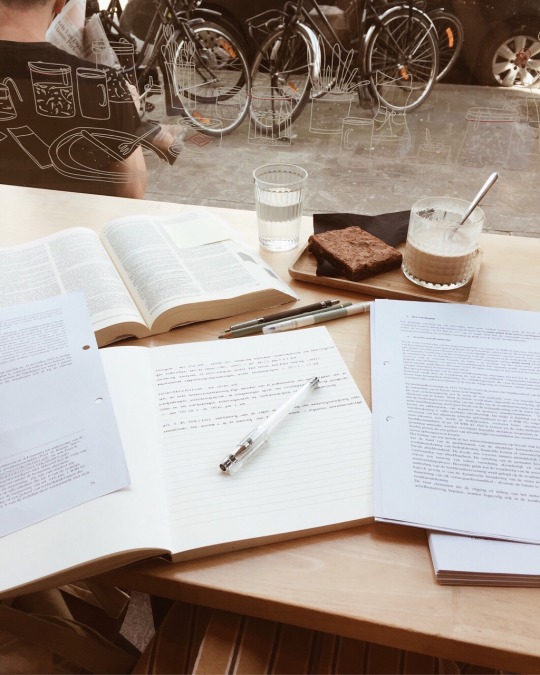Photo


Good ol messy pile o’ books i didn’t exactly need but still bought anyways cos deals
9K notes
·
View notes
Text
some things i’ve learned while studying in quarantine
drink more water instead of more coffee.
weekly goals are bullshit. set yourself 3-day goals. you’ll be less laid-back.
don’t just mindlessly stare at words. before you start studying, know your approach to it. have a plan.
summarizing the concept in your own words is the key part of taking notes. don’t just copy things down, convert them into your own way of talking, your own vocabulary, no matter how dumb and unprofessional it sounds.
don’t let the “studyblr aesthetic” fool you. studying doesn’t have to be pretty. summaries and notes can be messy as long as they’re comprehensible. you can always rewrite and reorganize them later. (honestly, you better do. and you better keep them.)
don’t throw away the papers you’ve solved your problems in. staple them to the fucking textbook. you need to see them constantly. cause you’ll need reminders of how far you’ve came, when you’re feeling discouraged.
don’t be an armchair analyst for your issues. if you have an idea then act on it.
remember: the exact point where it becomes difficult, is where your growth begins. take a deep breath, and try to focus on the paragraph in front of you.
get off your high horse and understand that if you’re a zero, you won’t go to 100 in a couple of days. first, you’ll need to reach 30, then from 30 to 60, and then from 60 to 90. nobody is 100 everyday. that happens very rarely.
you need to have fun everyday. you need to have peaceful time every single day. even on exam night. especially on exam night, actually. so make sure you’ve studied enough so you can have some time to yourself.
once you’re on a roll and in need of some challenge to stay on track, start writing down your studying hours. tell yourself you’re not allowed to do less than 80% of what you did yesterday. whatever the hell it was, even just one hour. so if yesterday you really studied for like, say 8 hours, today your goal is to study for at least 6 and a half hours. if you can’t keep up with that, make it 70%, or 60%.
be forgiving of yourself. be kind to yourself. even if you bounced back and lost your streak. start again. as slowly as you did before. take your time. it’s okay, you were there once you can get there again.
41K notes
·
View notes
Photo

Scala dei Giganti - The Giants Staircase.1483-85. Palazzo Ducale. Venice. marble.
http://hadrian6.tumblr.com
41K notes
·
View notes
Photo










some favourite shots from Florence last summer
17K notes
·
View notes
Text
Raise your hand if you grew up using literature and school as a form of escapism from the effects that generational traumas had on your life, resulting in an emotional attachment to academia and you never really living your teen years out to the fullest because of this.
4K notes
·
View notes
Photo







I hate the fog. I’m tired of this gray light. I’d like to find a new light, for paintings that we haven’t yet seen. Bright paintings, painted in sunlight. AT ETERNITY’S GATE (2018) dir. Julian Schnabel
1K notes
·
View notes
Text
I may be writing a 10 pages Late Medieval Essay due thursday. Instead, I procrastinate with beeing productive in other subjects because I’m afraid of the white page (my mind trick for this is to put smiley/sad face, whatever you want, at the begginig in order to don’t see the page plain white) :):
2 notes
·
View notes
Text
not so much study tips, more thoughts on university/studying in general
although these posts are abundant, i like to have my own collection of study tips/uni thoughts
- i’ve been viewing my studies as an office job, mostly because of the 9 to 5 mentality. i am not one for night studying, i have tried and tried and felt guilty when i heard others talk about their late night study sessions, but it is just not for me. which is fine, because with this 9 to 5 idea i have created working days for myself and i can use my evenings for extracurriculars, books, friends, netflix
- the train has (weirdly) become one of my favourite study spots. of course this really depends on the public transport you use. i am on a train for two hours a day, no transfer, and i either go to a silent area (have not yet seen this elsewhere, but dutch trains have carriages in which there is complete silence) or i put in my earpods. i love this because when i come home, i have already done so much work, e.g. organized my lecture notes of that day, inserted my professor’s comments into my paper etcetera
- although i’ve also learned to recognize when i am just done. sometimes i have had enough and it is way better to accept that and then i either listen to some music and stare at the passing landscape, or i watch an episode of the crown. when feeling exhausted, there’s no point in pushing and forcing yourself
- this goes for many many aspects: comparison will kill you. it is often still my tendency to compare myself to others on all levels - grades, kindness, clothing, weight, work ethic - but i make the effort to not ‘indulge’ in it. what my therapist told me has really helped: just notice that the urge to compare is there but then leave it be. like it’s a tiny spider crawling on your leg; you don’t have to do something with it
- on the topic of work ethic: don’t listen to your fellow students. don’t listen to what some wonderful academic says (online). don’t even listen to what your professors say regarding study hours. it has often made me feel very uncertain, but i think it is way better to figure it out yourself. to build up a feeling of trust towards yourself, so you can really start to notice, to feel, when you have done enough. that is something only you should be able to judge and not some external source
- sometimes i get overwhelmed with this sensation that i have not done enough, that i am lazy and have accomplished nothing. however, every (every!) time i have noticed this to be untrue. so perhaps i have not studied every chapter, but i have studied other chapters. i found the cliché of looking at what you have done to really be true. it helps me put things into perspective, i think we can really underestimate ourselves in how much work we have done. what you consider to be 20% may actually be 60%
- motivating internal monologues are completely normal and actually very good! give yourself that motivating speech, it’s like a snow track that becomes deeper and clearer everytime you repeat it
it helps me to look back on these at times, has been in my concepts for a while now (like some kind of motivating internal monologue) but i want this to have a place on my actual blog, because i believe tips like these (less focused on studying and more on coping with the whole world of studying/academia) are important as well
3K notes
·
View notes
Text
latin phrases worth knowing:
(in case you wanted to know because i fucking love this language)
ad astra per aspera - to the stars through difficulties
alis volat propriis - he flies by his own wings
amantium irae amoris integratio est - the quarrels of lovers are the renewal of love
ars longa, vita brevis - art is long, life is short
aut insanity homo, aut versus facit - the fellow is either mad or he is composing verses
dum spiro spero - while I breathe, I hope
ense petit placidam sub libertate quietem - with the sword, she seeks peace under liberty
exigo a me non ut optimus par sim sed ut malis melior - I require myself not to be equal to the best, but to be better than the bad
experiential docet - experience teaches
helluo librorum - a glutton for books (bookworm)
in libras libertas - in books, freedom
littera scripta manet - the written letter lasts
mens regnum bona possidet - an honest heart is a kingdom in itself
mirabile dictu - wonderful to say
nullus est liber tam malus ut non aliqua parte prosit - there is no book so bad that it is not profitable in some part
omnia iam fient quae posse negabam - everything which I used to say could not happen, will happen now
poeta nascitur, non fit - the poet is born, not made
qui dedit benificium taceat; narrat qui accepit - let him who has done a good deed be silent; let him who has received it tell it
saepe ne utile quidem est scire quid futurum sit - often, it is not advantageous to know what will be
sedit qui timuit ne non succederet - he who feared he would not succeed sat still
si vis pacem, para bellum - if you want peace, prepare for war
struit insidias lacrimis cum feminia plorat - when a woman weeps, she is setting traps with her tears
sub rosa - under the rose
trahimir omnes laudis studio - we are led on by our eagerness for praise
urbem latericium invenit, marmoream reliquit - he found the city a city of bricks; he left it a city of marble
ut incepit fidelis sic permanet - as loyal as she began, so she remains
119K notes
·
View notes
Photo




Astronomical Clock 1540, Munster, Westfalen. Photo credit
32K notes
·
View notes
Text
How to Study History (at uni)
Hi everyone! Now that I’ve (almost) finished my masters and have thus been a history student for four years, I thought this would be the best time to make a post with four tips about how to study history. I studied in the UK, but hopefully these tips will be helpful wherever you are in the world!
1. Do. Your. Damn. Readings.
97% of the work for a history degree is individual. If you ask me to describe my degree in one sentence, it would be “me, alone in a room, reading”. If you study history (but I think this goes for most humanities subjects), you need to do your reading, cause otherwise, you will literally do no work at all. Whether it’s for an essay that’s worth 80% of your final grade or for an optional seminar, always, always do the reading- there have been countless moments when I’ve either been the only person in the seminar who kind of knew what was going on, or when I’ve gotten extra marks during an exam because I knew a random fun fact from some extra reading I had done. So please, please do your reading.
2. Go to all your classes, you won’t have many!
Over the past four years, I’ve had anywhere between 8 and 3 hours of class a week. If you decide not to show up to the few hours you do have to be at uni for, not only will you be extremely unpopular with your lecturers, but it’ll also be such a waste of the time, effort, and money you’re putting into uni. I always calculated at the beginning of the year how much I was paying per hour of class. Trust me, it’s a lot harder to skip when you know you’re wasting £100 every hour you don’t go!
3. Pick essay topics you genuinely like (even if the lecturers hate it)
I vividly remember a lecturer telling the class we shouldn’t write essays about witches because he had read so many that he absolutely despised the topic now. Me being me, I listened to him, and it took me four years to, eventually, write an essay on the topic. Which I loved. If it hadn’t been for that guy, I would’ve discovered this interest so much earlier, and I now wish I’d just trusted my gut and gone with the topic that spoke to me the most. Always pick an essay topic you like, otherwise writing the essay will feel more like a punishment than fun, which is what it should be. This is the time to let your personality shine! I’ve written two essays on Pocahontas because I LOVE the Disney movie and, let me tell you, I enjoyed those way more than when I listened to what the lecturers wanted. You do you boo!
4. Have some fun!
I’m notorious for making up the weirdest essay (sub)titles and/or introductions. The first essay I ever turned in (on the economy of marriage in Pride and Prejudice) contained the lyrics “girls don’t like boys, girls like cars and money” from a song by Good Charlotte. And, to be honest, my jokes haven’t improved much in four years, as is evidenced by the fact all the subtitles in my essay about pirates were quotes from Pirates of the Caribbean movies. Do I love thinking of those things? YES. Do I care whether others (lecturers/students) judge me for it? NO. Again: show your personality! My undergrad dissertation had chapter titles all taken from the song Lady Marmalade (the thesis was about prostitution), and guess what, my supervisor loved it. More importantly, so did I!
I hope these ramblings were semi-helpful! If you have any other questions or just want to have a chat about studying history (or scream about your fav historical figure I’m up for that too), feel free to message me!!
1K notes
·
View notes
Text
reminder that anyone who says that history is a definite narrative with one set of facts and one interpretation of them is definitely missing something
96 notes
·
View notes
Text
Stop glorifying unhealthy study habits
Because not enough are talking about this
A lot of people (not just langblr, studyblr too )have been glamorizing the way Asians study in certain countries as depicted on tv, news , various media sources. Saying oh they are working so hard for their goal and look how dedicated they are. Please stop. Seriously. My degree is in psychology and I focus on mental health. I’ve done research in Korea and continue to take psychology classes in korean about various issues (I’ve taken cultural psych, neuro psych 1&2, psych of happiness and I’m currently taking psychology of addiction). I’ve also extensively talked to high schoolers in Korea about this “dedicated study” and most of them said they were stressed to the point of having physical symptoms of being stressed out, almost half were depressed or showed symptoms of anxiety and I won’t even get into things like suicidal thoughts, actual suicide, self harm, eating disorders that are also happening in correlation to study related stress manifesting itself in other ways. This isn’t just Korea. I’ve read research (just not as extensive about the same happening in other Asian countries and even some western now and days) Why the heck are y’all out here trying to glorify something that is clearly unhealthy and causing other people harm? And then promoting it to your followers as something to “motivate them” ?
Getting into your dream school/ uni, becoming fluent in 2 month in a language, whatever is not worth it if you end up hating life, physically unhealthy or mentally ill as a result of it
Please reblog this because I think it’s so important **
9K notes
·
View notes
Text
nothing frustrates me more than people calling the medieval period the “dark ages”
17 notes
·
View notes
Photo

2020.0503
Some (more) Late Medieval notes on a sunny afternoon.
44 notes
·
View notes
Photo

Azules contra Grises (North Against South) by William Camus
«La libertad y la civilización no eran más que palabras que ocultaban una vida dura de trabajo»
2 notes
·
View notes

